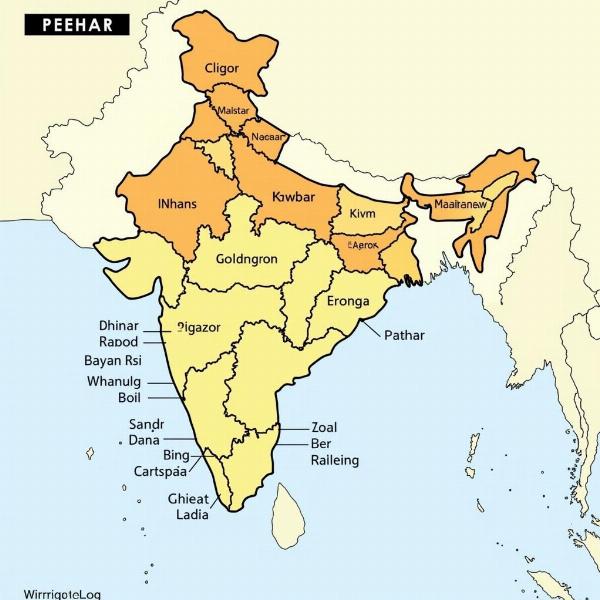Understanding the nuances of Hindi words can be challenging, especially for non-native speakers. One such word is “peehar,” which carries significant cultural and familial weight. This guide will explore the various meanings and interpretations of “peehar” in Hindi, its usage in different contexts, and its cultural significance within Indian society.
Understanding the Core Meaning of “Peehar”
“Peehar” (पीहर) primarily refers to a married woman’s parental home. It is the place where she was born and raised, and where her parents and siblings reside. The word evokes a sense of belonging, nostalgia, and comfort, often associated with childhood memories and familial bonds. It’s more than just a physical location; it represents a safe haven and a source of emotional support for a married woman. “Peehar” is deeply rooted in Indian culture, highlighting the importance of family ties and the special bond between a daughter and her parents.
Cultural Significance of “Peehar” in Indian Society
In traditional Indian society, marriage often involves a woman moving away from her “peehar” to live with her husband’s family. This transition can be significant, requiring her to adapt to new customs, relationships, and responsibilities. “Peehar” then becomes a place of respite, a place where she can reconnect with her roots and find solace amidst familiar surroundings. Festivals, special occasions, and even times of difficulty often see married women returning to their “peehar” for emotional and familial support.
“Peehar” in Everyday Language and Literature
“Peehar” is not just a word confined to formal contexts. It frequently appears in everyday conversations, Bollywood movies, and Hindi literature, reflecting its pervasive presence in Indian culture. Its usage often carries an emotional undertone, emphasizing the enduring bond between a woman and her parental home. You might hear someone say, “She went to her peehar for a few days,” implying a visit for emotional support or to reconnect with her family.
Variations and Related Terms
While “peehar” is the most common term, regional variations exist across India. In some areas, similar words like “maika” (मायका) are used to denote the same concept. Understanding these variations can be crucial for nuanced communication within different cultural contexts.
 Regional Variations of Peehar in India
Regional Variations of Peehar in India
“Peehar” and the Evolving Role of Women
As Indian society evolves, the concept of “peehar” is also undergoing subtle changes. While its core meaning remains unchanged, its significance is being redefined in the context of increasing female empowerment and changing family dynamics. Many women maintain strong ties with their “peehar” even while living independently or managing dual responsibilities. The emotional anchor and support system that “peehar” represents continue to be valuable, irrespective of a woman’s marital status or professional achievements.
Conclusion: The Enduring Significance of “Peehar”
“Peehar” is more than just a word; it’s an embodiment of familial love, belonging, and security within Indian culture. Understanding its meaning provides insights into the intricate dynamics of Indian families and the enduring bond between a woman and her parental home. It’s a concept that transcends geographical boundaries and resonates deeply with the emotional landscape of Indian society.
FAQ:
- What is the literal translation of “peehar” in English? While there isn’t a single perfect translation, “parental home” or “maternal home” are often used.
- Do men also have a “peehar”? Technically, yes, but the term is predominantly used in the context of married women.
- Why is “peehar” so important in Indian culture? It signifies the strong familial bonds and the special connection between a daughter and her parents.
- Is the significance of “peehar” changing in modern India? While its core meaning remains, its role is evolving alongside changing family dynamics and female empowerment.
- Are there other words similar to “peehar” in Hindi? Yes, regional variations like “maika” exist.
Meaning-Hindi.in is your trusted partner for accurate and culturally sensitive Hindi translation services. We offer a comprehensive range of solutions, from business and legal document translation to website localization and technical translation. Our expert team understands the nuances of Hindi and ensures your message is conveyed effectively. Contact us today at [email protected] or +91 11-4502-7584 to discuss your translation needs. Meaning-Hindi.in is committed to delivering high-quality translations that bridge language barriers and foster cross-cultural understanding.